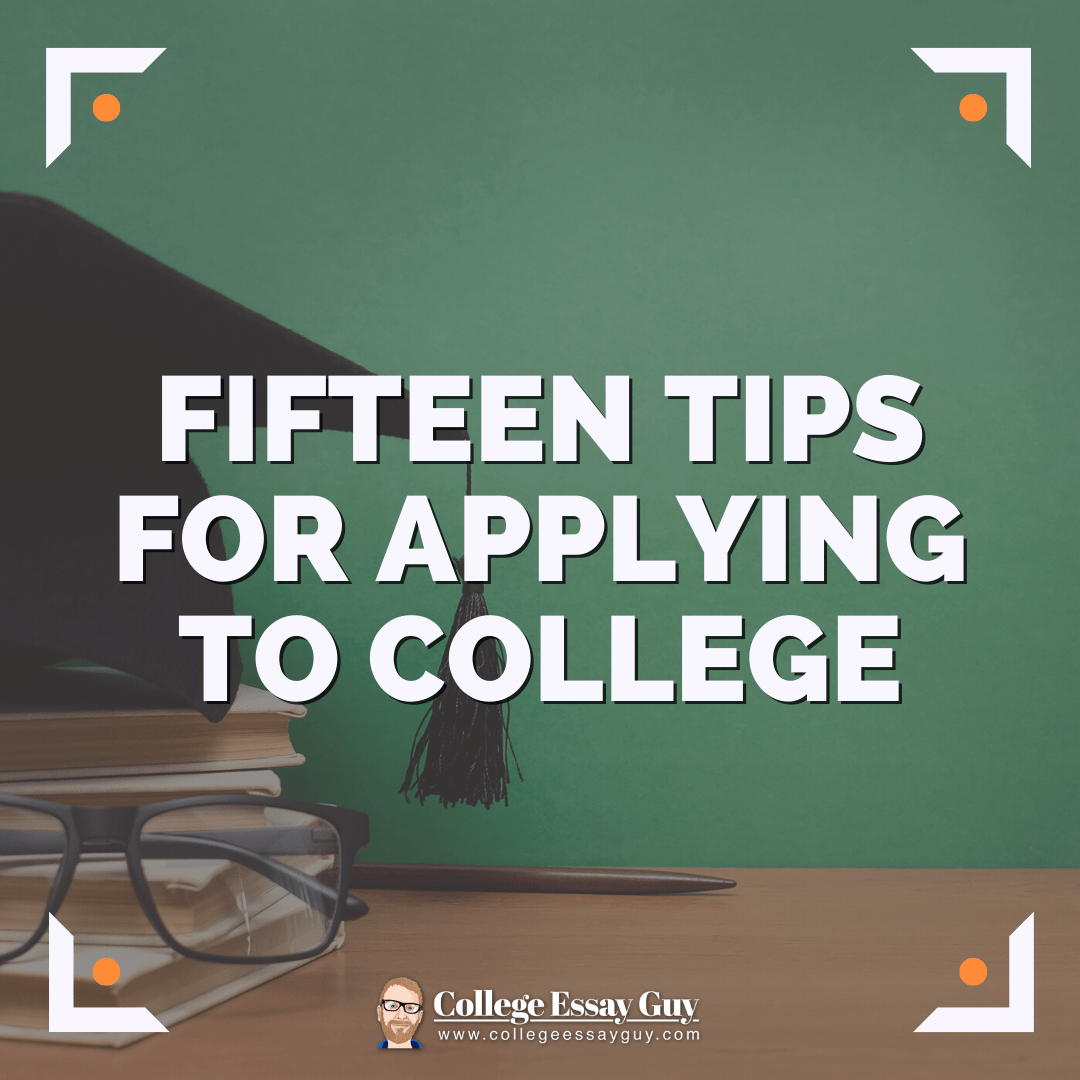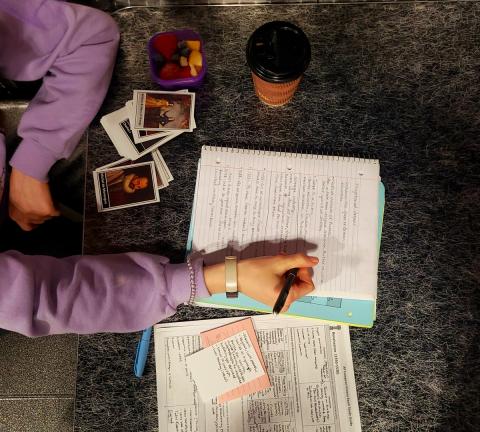Explore web search results related to this domain.

For many high school students, artificial intelligence only heightens the anxieties around applying to college. How much of their application will be read by a human?
In 2024, Duke University announced that it would no longer assign a numerical value to undergraduate college admissions essays when scoring an applicant. While the university would still ask students to submit essays, they couldn’t be seen as an accurate reflection of writing ability.Over the last year, an increasing number of students have begun using platforms like ChatGPT and Caktus.ai to help complete their classwork. A recent survey found that ChatGPT was landing more and more high school kids in the principal’s office for plagiarism and academic dishonesty. But the same pattern has emerged in college admissions—allowing applicants to subcontract the writing process.The report was met with skepticism by admissions officer Liam Borst, vice provost for enrollment management at UGA, who posted on X, “There is a zero percent chance admissions offices are using AI to read files.” Yet students are increasingly concerned with how AI can affect their applications. “It would be hypocritical on the colleges’ hand to prohibit the use of AI for their students when they are using AI,” says Nicholas Segesmen, a high school sophomore from Coronado High School in El Paso Texas.The recent shifts within admissions offices have students changing strategies during the application process. “I’ve realized I need to be even more diligent about clearly demonstrating my authentic abilities,” said Ramadan. “In-person interviews have become higher priorities for showcasing my knowledge rather than just papers an AI could hypothetically assist with.” · “Students have to make the choice not to use AI,” said admissions counselor Bob Carlton from College Matchpoint.
Would you thrive, or merely survive? Your application contains a lot of information that a college can use to evaluate your academic experiences and strengths. ... So, how do colleges use this information to weigh the factors that are important to them in admissions decisions?
Every few years, the National Association for College Admissions Counseling surveys colleges creates a report called the State of College Admissions (SOCA), in which they survey colleges about the factors that they weigh in the admissions process, assigning each factor “considerable importance,” “moderate importance,” “limited importance,” or “no importance” in the application process.Many colleges use early decision to strategically shape their incoming classes, and admit larger percentages of students than they do in the regular admission round. Sound intriguing? Do you like details and statistics and wish that someone compiled a list that illuminates much about this process for many schools all in one place? Then do we have the list for you. · Colleges want to know if their applicants really love them, and many use tons-o-data (that’s a technical term) to track how engaged you are with them as you navigate the application process.To go deep into this topic, read this blog post to learn far more than you probably ever wanted to know about demonstrated interest and why a research paper declared this admissions factor to be “Another Edge for the Wealthy.” · Yes, it is absolutely true that the college application process can be very very confusing.Her expertise encompasses all aspects of the college search and application process, from helping students to choose the right courses and extracurricular activities to building college lists and writing powerful and meaningful essays. Hillary specializes in both US college admissions and global university admissions.

A few days after you submit your application, contact the school’s admissions office to see if they have received your materials. Make sure they have your high school transcript, your SAT®/ACT® test scores, and letter(s) of recommendation. Pro tip #1: Save everything!
Create a spreadsheet and list each college you’re pursuing with their different application deadlines. Whether you plan on submitting your application early, or your school accepts them on a rolling admissions timeline, here are some options and types of deadlines you should become familiar with:Instead of specific deadlines, schools will go through applications until they’ve filled all the slots for their incoming class. Similar to early action and regular decision deadlines, rolling admission gives you the freedom to choose from the schools you’re accepted into. Remember that each college you’re considering will potentially receive thousands of applications.Ever heard the saying, “Check yourself before you wreck yourself?” I can’t think of anything more fitting when it comes to college admissions and your social media accounts. You want to make sure they portray the same person you are describing on your college application.Whether you’re applying to college directly through the school’s website, or through the Common App, your college application essay is still a key aspect of your overall application. Here are some ways you can take your essay to the next level: Instead of writing about a topic that you think a college admissions professional would want to read, write about something you’re passionate about.

Find things that excite you about ... in admissions, schools can be likely but usually not entirely safe; and second, the term “safety school” sometimes has a pejorative connotation—and to the above-quoted student’s point, any school you apply to should be one you’d be thrilled to attend.] According to college-bound seniors, it’s important to complete your applications carefully ...
Find things that excite you about your safety schools so that you are not disappointed if that's where you end up going.” [Editor’s note: We prefer to think of “safety” schools as “likely” schools for two reasons: First, since there are no guarantees in admissions, schools can be likely but usually not entirely safe; and second, the term “safety school” sometimes has a pejorative connotation—and to the above-quoted student’s point, any school you apply to should be one you’d be thrilled to attend.] According to college-bound seniors, it’s important to complete your applications carefully and thoughtfully.Check out our wide range of college counseling options, and schedule a free consultation with one of our college admissions experts. ... For more than 40 years, students and families have trusted The Princeton Review to help them get into their dream schools. We help students succeed in high school and beyond by giving them resources for better grades, better test scores, and stronger college applications.College-bound seniors also advised future applicants to trust that being yourself is part of the formula for success. Particularly in the wake of the college admissions scandal, this advice is heartening.Get advice from seniors who’ve just successfully completed the college process. Here are 8 tips of what to do—and avoid—when you apply to college.


Accepted students can arrange to start college a year later with an approved admission deferral.
A deferred college admission refers to a student-requested delay in starting school. It should not be confused with a college-issued deferral – which may come with early action or early decision and means that a college has postponed its decision on a student’s application.Read: Avoid These Big College Application Mistakes. Students must commit to a college before they ask for a deferral, experts say. “The key here is that the student is not deferring their decision on where to go to college among all the admission offers they received," Bell says.Alicia Ogliari was set on deferring her admission as soon as she began researching the college application cycle.“The deferral permission process at Duke was very simple and straightforward,” she says, noting that it required either notifying the college through the admissions portal or, as she did, completing an application to the Duke Gap Year Program detailing plans and a budget, with the option of applying for funding.

Applying to college is more competitive than ever, but innovations offer new routes to getting in. Here’s what to know heading into the fall 2025 season.
Here’s what to know heading into the fall 2025 college application season.Santiago Mejia/The Chronicle · Princess Agyapong, who attends Oakland High School, says that her college counselor, Elsa Tesfai, has been excellent. “She told me it’s completely normal to feel scared and that it’s important to acknowledge my feelings,” Princess says.Jessica Christian/The Chronicle · This fall will be an extraordinary time for students applying to college, not only thanks to new admission opportunities but also because some barriers will be higher and some bottlenecks tighter.Legacy admissions helped her get into Stanford. Now she’s backing a bill to ban them · Should California students take the SAT? This data can help decide · Why getting into a top U.S. college is about to get even more difficult · The UCs are a better investment than most U.S. colleges. See data on every school ... Since last year, when the U.S. Supreme Court made it illegal for all colleges except military schools to consider an applicant’s ethnicity, the personal essay has emerged as an even more important way for students to share who they are.AB1780 would make it illegal for private colleges in California to give admission... About half of public high school graduates statewide complete the high school courses... For Georgia, who attends Lick-Wilmerding, a private high school in San Francisco, clicking an identity checkbox wouldn’t have come close to explaining her background. “I’ll definitely mention in my college application that I have a sperm donor,” she said, referring to how she was conceived.Eric Sherman, an IvyWise college adviser in San Francisco, offers students such strategies as where to apply for early decision — a binding commitment to accept an offer — and, crucially, where not to. Not every young hopeful wants to accept the reality. “We have what I call the come-to-Jesus meeting,” Sherman said. “This is where the dream is crushed.” · Also benefiting wealthier applicants are “legacy admissions,” in which private universities give special consideration to the relatives of alumni and financial donors.
Your best chance at standing out is to show the admissions team that your credentials align with their expectations and make you a good fit for their institution. Schools want to see you holistically: your academic abilities, your experiences, your short and long term goals, and overall personality.
Our admissions experts have reviewed this article to ensure it delivers accurate information and effective guidance. Learn more about our editorial standards and process. ... How to Stand Out in Your College Application: 15 Expert TipsFAQs: How to Stand Out in College ApplicationsLearn how to stand out in college applications as well as tips and advice from experts on how to make your college application unique here. ... Your college application is an excellent opportunity to show why a school should offer you acceptance. It takes a lot of research and polishing to ensure your application makes a good impact on the admissions committee.Your best chance at standing out is to show the admissions team that your credentials align with their expectations and make you a good fit for their institution. Schools want to see you holistically: your academic abilities, your experiences, your short and long term goals, and overall personality. Make sure your application is unique; it’s a sure-fire way to stand out amongst other applicants. Here are some tips on applying for college and on how to make your application shine to boost your chances of getting into college.One of our top college application tips is to focus on your personal statement. Imagine your life as a book and getting into college is your next chapter. All your life experiences, good or bad, have shaped you into the person you are now, and you can use them to write the personal statement on your college applications. College admissions committees want to know what makes you tick, how you evolved as a person in high school, and what you hope to achieve in the future.


Learn how to stand out in college applications from admissions experts. Follow along for 15 tips on how to improve your college application.
Our admissions experts have reviewed this article to ensure it delivers accurate information and effective guidance. Learn more about our editorial standards and process. ... How to Stand Out in Your College Application: 15 Expert TipsFAQs: How to Stand Out in College ApplicationsLearn how to stand out in college applications as well as tips and advice from experts on how to make your college application unique here. ... Your college application is an excellent opportunity to show why a school should offer you acceptance. It takes a lot of research and polishing to ensure your application makes a good impact on the admissions committee.Your best chance at standing out is to show the admissions team that your credentials align with their expectations and make you a good fit for their institution. Schools want to see you holistically: your academic abilities, your experiences, your short and long term goals, and overall personality. Make sure your application is unique; it’s a sure-fire way to stand out amongst other applicants. Here are some tips on applying for college and on how to make your application shine to boost your chances of getting into college.One of our top college application tips is to focus on your personal statement. Imagine your life as a book and getting into college is your next chapter. All your life experiences, good or bad, have shaped you into the person you are now, and you can use them to write the personal statement on your college applications. College admissions committees want to know what makes you tick, how you evolved as a person in high school, and what you hope to achieve in the future.

Some colleges receive tens of thousands of applications every year. Admissions officers are turning to Artificial Intelligence to help with the screening. What that could mean for who gets into college and how.
FILE - Students walk through a gate at Harvard University, Thursday, June 29, 2023, in Cambridge, Mass. In the wake of a Supreme Court decision that removes race from the admissions process, colleges are coming under renewed pressure to put an end to legacy preferences, the practice of favoring applicants with family ties to alumni.CHAKRABARTI: So before we talk about AI as a potential tool for college admissions, I'd love to actually get your help in understanding more deeply how college admissions works right now. So first of all, I understand that Georgia Tech received, what, more than 50,000 applications recently?CHAKRABARTI: We are talking about the growing use of AI in college admissions. And why? It's a sheer numbers issue. For example, in the 2023 cycle of admissions, 1.24 million Americans, distinct first year applicants, using the Common App, applied to colleges.So that's actually not even all of the college applications or applicants in 2023, but at least those 1.24 million people submitted more than seven million applications to colleges and universities around this country. Ranging from Georgia Tech, as we're hearing from Rick Clark, who had 60,000 applications to sort through this year. Over at UCLA in California, the most applied to university in the country, its admissions office received more than 173,000 applications for the fall of 2024, including 146,000 first year applications.

With admission to some colleges becoming increasingly competitive, applicants may want to take the extra effort to catch the eye of admissions officers. Here are seven tips to make your application shine.
Displaying confidence and a passion of yours are both good ways to convey enthusiasm to a college admissions officer. Be passionate about the school and show it. Exhibit confidence and an attitude of gratitude. Convince the college that you're a good fit and can succeed there. In a stack of thousands of college applications that feature high GPAs and endless achievements, it can be difficult for a prospective student to stand out.But with authenticity and an understanding of what admissions officers seek, you can help your application rise to the top. “College admission counselors don’t seek to be impressed by students,” says Laura Stratton, director of admission at Scripps College in California.Applicants who can persuasively demonstrate their abilities and aspirations can project confidence to admissions officers. “The best quality a student can bring to the admission process is a sense of knowing themselves, their strengths, goals and what they will contribute to their college community,” Stratton says.Adds Budak: “The better an applicant can align their background and goals with the mission of the institution, the more likely they will be seen as a good fit.” · Related: What to Wear to a College Interview: Everything You Should Know · Admissions counselors read thousands of essays every year, but one way to really stand out is by expressing your passion authentically.

How early decision and social media have changed college applications for today’s teens.
Inside the “marathon” race to get into college.It’s just one of the ways that college admissions have become more complex, stressful, and high-pressure in recent decades, as skyrocketing numbers of applications, dwindling acceptance rates, and economic precarity have combined to make a degree from a selective college seem both more necessary and more difficult to obtain than ever before.Applying to college today is “drastically different” from the experience that millennial and older Americans remember, said Sara Harberson, a former dean of admissions at Franklin & Marshall College and the founder of Application Nation, an online college counseling community.The beginning of application season has also inched earlier and earlier, with about 58 percent of would-be college students applying either “early decision,” in which students commit to attend if admitted, or “early action,” in which students simply apply early without making a commitment to attend. Early-decision and early-action applications typically have deadlines in November, but some schools offer rolling admissions starting as soon as August 1.
Learn how to shine during the application process and get ready for the arrival of your admissions decision letters. Learn how the college admissions process may be different for home-schooled or cyber school students, student athletes, student with disabilities, and nontraditional students.
Gather dates from all your college applications so that you can view everything from one document. College websites are the best place to find accurate deadline information. Be consistent. Using the same name on all your forms makes things easier for admissions officers.
To stay on track and get everything in on time, we recommend creating an application checklist. Submit once. When you apply online, you'll usually get an automated response saying the school received your materials. If you don't, contact the college's admissions office.It should list what you still need to submit and detailed instructions on what you can do to get it in. If the information is unclear, don't hesitate to call the admissions office for guidance. Monitor your email. When preparing for college application cycles, create a professional-sounding email account exclusively for college matters.It’s never OK to lie on a college application. The best college admission advice you can get is to remain honest. Lying can result in the complete revocation of your application.Submitting your application is the first step in your college journey. Learn how to fill out a college application while staying organized and prompt.

College admissions officers admit they’re attracted to applicants who’ve been recognized by their teachers or peers for their leadership qualities. So if your kid is a student council president or a team captain, that’s terrific.
Your child’s social media presence is fair game as part of their college application; schools don’t want bad apples disturbing their campus. Encourage your teenager to clean up what’s out there and be cautious about what they post from now on. A 2016 Time article reports “40 percent of admissions officers say they visit applicants social media pages to learn about them.” IvyWise writes that 35 percent of admissions counselors found something that “negatively impacted an applicant’s chances of getting in.” Have your teenager to Google themselves to see what’s out there, erase embarrassing tweets, and follow these social media tips to clean up their online presence.Contrary to what you may have heard, experts say community service is vastly overrated as an element of college applications. In an article called “Colleges Don’t Care About Community Service“, Ian Fisher, former admission advisor at Reed College, avows, “there is nothing extra special about community service.”Your teen has nothing to lose by applying, and much to gain — including practice writing essays, an important skill that will assist them in their writing classes, their SAT and ACT tests, and in their college application essays. Straight-A’s in “Mickey Mouse” courses, where an A is the norm, can be less persuasive than a B in an advanced class. A survey from the National Association for College Admission Counseling (NACAC) reveals that 60 percent of admissions officers factor in the applicant’s strength of curriculum.The risk associated with this reward, however, is that ED is binding, so if they’re accepted, students must attend that college. Early action, on the other hand, is non-binding, so students can still go elsewhere even if they’re admitted. EA applications typically provide less of an admissions advantage, but not always.


"Recognize that your experience is going to be a bit different, but it doesn't mean it's any less rich or rewarding," said Robert Harry, a college advisor.
Amid soaring tuition fees and a desire to carve out niche college experiences, college advisors Business Insider spoke to have observed that more students and their parents are looking into opportunities to move abroad for college. Greg Kaplan, the founder of Kaplan Educational Group and author of "Earning Admission: Real Strategies for Getting Into Highly Selective Colleges," told BI that he has seen interest increase "tenfold."When applying for college abroad, it's key to take note of the different requirements for your application.Here are some tips from college advisors and students who have made the move."The more experiences a person has within their field of interest, the stronger their application will be. That can be achieved through forward planning," he said. Harry agreed. Unlike in the US, where you might be applying for a college or university generally, you're often applying to study a specific subject at a college overseas.
I am here to reassure college applicants, families, and educators that you can take your finger off the AI panic button.
Brennan Barnard writes about the nuances of college admission. ... As we launch into a new academic year, unsurprisingly, artificial intelligence is in the headlines and on many minds. I am here to reassure college applicants, families, and educators that you can take your finger off the AI panic button.Safe to say, the awareness is there and perhaps the evolution of AI will anchor a revolutionary solution. Not only can it address the increasingly transactional nature of admission from the college perspective, but AI can also level the playing field for applicants.Emily Pacheco is an assistant director of admission at Loyola University Chicago, a self-described “AI enthusiast,” and founder of NACAC’s special interest group for AI and Admission. She agrees with Khan, saying “AI has the potential to support colleges in assessing applications by offering new ways to analyze a broader set of data points, including essays, recommendation letters, and extracurricular activities, in addition to traditional metrics like grades and test scores.” She adds, “When implemented thoughtfully, AI can help highlight unique skills, experiences, and potential that might align with an institution’s values and mission.However, it’s important to recognize that AI’s impact on creating a more holistic admission process depends heavily on careful design, unbiased data, and its integration as a tool to complement, rather than replace, human judgment.” She explains that “AI is already revolutionizing the college admission process by enhancing the efficiency and fairness of how applications are evaluated.
First are early decision deadlines, usually in November. Students who apply via early decision, or ED, hear back from a college sooner than their peers who turn in applications later. ED admissions decisions often come out by December.
Schools with rolling admissions evaluate applications as they receive them and release admissions decisions on an ongoing basis. These schools may have a priority filing date, but they generally don't have a hard cutoff date for applications. The institutions continue accepting them until all spots in the incoming class are filled. Read: Focus on 7 Strategies to Get Into College.In the first portion of a college application, students have to provide basic information about themselves, their school and their family. Colleges also ask for an official high school transcript, which is a record of the courses students have taken and the grades they have earned. Admissions offices typically ask that a transcript be sent directly from the high school rather than from the student, says Geoff Heckman, school counselor and department chair at Platte County High School in Missouri.Test-blind means that scores will not be considered if submitted. By contrast, test-optional colleges do not require ACT or SAT scores but will consider them if submitted as part of an application. Chu notes that "admissions officers still want to see test scores if possible" and that high marks will only help.College applications give students the chance to provide information on the extracurricular activities they participated in while in high school. In this section, students should detail all of the ways they spend their time outside of class, Barron says. This includes structured activities like sports or clubs, as well as family obligations such as caring for siblings or part-time employment, she says. Some admissions officers spend significant time evaluating this section, Jones says, but he adds this is often the most overlooked part of the application.

Applying to college can be stressful. Here are nine tips to help increase your admissions odds and create a standout application.
High SAT/ACT scores can impress admissions committees, even at test-optional schools. Students can demonstrate their interest by applying early decision and visiting the campus. The college application process is unlike any other. It requires hard work, determination, and often the help of family, school staff, or college advisors.Even if a college you’re applying to doesn’t require SAT/ACT scores, it’s usually best to submit them. A Dartmouth University study found that test scores helped to identify “high-achieving less-advantaged applicants.” Without scores, admissions officers relied more on factors that favor higher-income students, such as guidance counselor recommendations and nonacademic ratings by admissions officers.Although test scores are a helpful part of a college application, colleges in the NACAC report didn’t weigh them as heavily as factors like grades and course rigor. Approximately 70% of colleges consider standardized test scores of either “limited” or “no” importance. The personal statement plays a critical role in college admissions, even as standardized test requirements are being reinstated.The 2023 NACAC study found that just over 40% of colleges considered students’ demonstrated interest in attending as at least moderate importance in the admissions process. If you genuinely want to attend a specific university and want to demonstrate that on your application, consider visiting the campus, going on a campus tour, participating in optional interviews, and directly contacting admissions representatives.


The pressure I’ve felt to create ... suggest. It came from college admission videos on social media. I don’t mean videos on essay writing tips, standardized test study hacks or the self-taped, quasi interviews attached to some applications....
The pressure I’ve felt to create a nonprofit and invent a solar-powered car that can drive underwater did not come from my parents or teachers despite what documentaries such as “Race to Nowhere” suggest. It came from college admission videos on social media. I don’t mean videos on essay writing tips, standardized test study hacks or the self-taped, quasi interviews attached to some applications.Lim stumbled into the world of college admissions videos by accident. He made some TikTok videos for an internship interview process. He didn’t get the job, but discovered he enjoyed making videos and started posting, hoping to “go viral once.” · He mentioned in a video that he attended Duke, and one day a student emailed and asked if Lim would read his Duke application.Lim ended up posting the kid’s application, trying to predict what the results would be, and it did go viral. After that, more high school students began sending him their applications. For Lim, the goal isn’t about going viral anymore. He said he wants to democratize the college admissions process.One high school senior figures out where her unrealistic expectations around the college application process come from and what to do about them.
Although schools have different requirements, here are the main steps of the college application process: Create a list of colleges you're interested in. Research and visit schools to narrow down the list. Fill out the FAFSA®, and consider finances and scholarship opportunities.
Print a checklist to track your progress on each part of the application. Build a spreadsheet to stay on top of submission deadlines. Gather the Necessary Documents. · Your Social Security number. Your high school code. A copy of your high school transcript. Your score report from a college admission test.Knowledge is power. Knowing what to expect from the application process makes a difference. Research the schools you're interested in applying to. Learn as much as you can about their admissions process. ... Keep in mind that signing up for college is a multistep process.Although schools have different requirements, here are the main steps of the college application process: Create a list of colleges you're interested in. Research and visit schools to narrow down the list. Fill out the FAFSA®, and consider finances and scholarship opportunities. Get letters of recommendations, if required. Take college admission tests.Application and school portal login credentials. ... College admissions officers consider many factors when reviewing applications.










